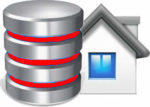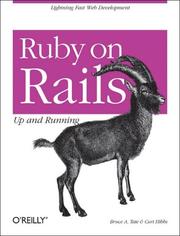Seven Short Chapters to Lightening Fast Web Development with Ruby on Rails
Rails may just be the most important open source project to be
introduced in the last ten years. So claim Bruce Tate and Curt Hibbs, authors of
the just-released Ruby on Rails: Up and Running (O’Reilly). They’re certainly
not alone in their belief. Now in its second year of existence, the framework
has seen (by a conservative estimate) more than half a million downloads. The
publishing world has rallied in support of Rails developers; in fact, by
December 2006, according to Tate and Hibbs, we’re likely to see more books on
Rails than on any of Java’s single flagship frameworks, including JSF, Spring,
or Hibernate.
What makes Rails different from the other quick-and-dirty environments out there
is that Rails lets developers keep the quick and leave the dirty behind. “It
lets you build clean applications based on the model-view-controller
philosophy,” Tate and Hibbs explain. “Rails is a special framework.”
“Ruby on Rails is the harbinger of a new way of developing software,” adds
Hibbs. “Future generations of software developers will look back and recognize
this as the opening volley in a revolution that pushed productivity to new
heights.” Rich internet applications, Ajax, Web 2.0, social web apps,
interconnectedness, and mashups will all be part of this: “Ruby on Rails is one
of the enablers at the center of this revolution.”
The advantage of using Rails is that development becomes much simpler;
programmers can focus on the creative parts of their applications rather than on
the wiring and plumbing. “Ruby on Rails: Up and Running” provides a quick,
no-nonsense introduction that takes developers from zero to full speed in seven
chapters (167 pages in all). The book shows how to build real applications,
covering everything from using scaffolding to “test the waters” to writing
responsive, user-pleasing applications with Ajax.
“Our book will quickly launch readers into a basic understanding of Ruby on
Rails, offering enough knowledge and guidance to point them down the path of
full mastery,” says Hibbs. But the book goes even further. It shows the
established programmer, armed with nothing more than a little Ruby knowledge,
how to go beyond the basics and become productive in Rails. The book covers:
” Using ActiveRecord to work with a database
” Using Migrations to modify a database without using SQL
” Modeling relationships between tables in a database
” Building controllers to express an application’s fundamental operations
” Developing HTML views with templates
” Incorporating Ajax features into applications
” Writing unit tests, functional tests, and integration tests
Hibbs acknowledges that determined would-be Ruby on Rails users can find most of
the information in the book on the Internet. “However, if they want the
shortest, easiest way to jumpstart their knowledge of Ruby on Rails, this book
will save them a lot of time.”
Ruby on Rails: Up and Running doesn’t attempt to reiterate the reference manual.
Instead, it presents the big picture of how Rails applications hold together. It
shows readers where to go for information that isn’t covered in the chapters.
Readers will see how Rails dynamically adds features to all database models,
called Active Record objects. Then, by understanding the big picture, they’ll be
able to make better use of the best reference manuals to fill in the details. In
short, this book gives readers the foundation they need to get up and running.
If you want to work with Ruby on Rails, it’s the book you have to have.

